DEEP SEA MINING MEETING GETS SOME EAR BLEEDING
06.10.2023
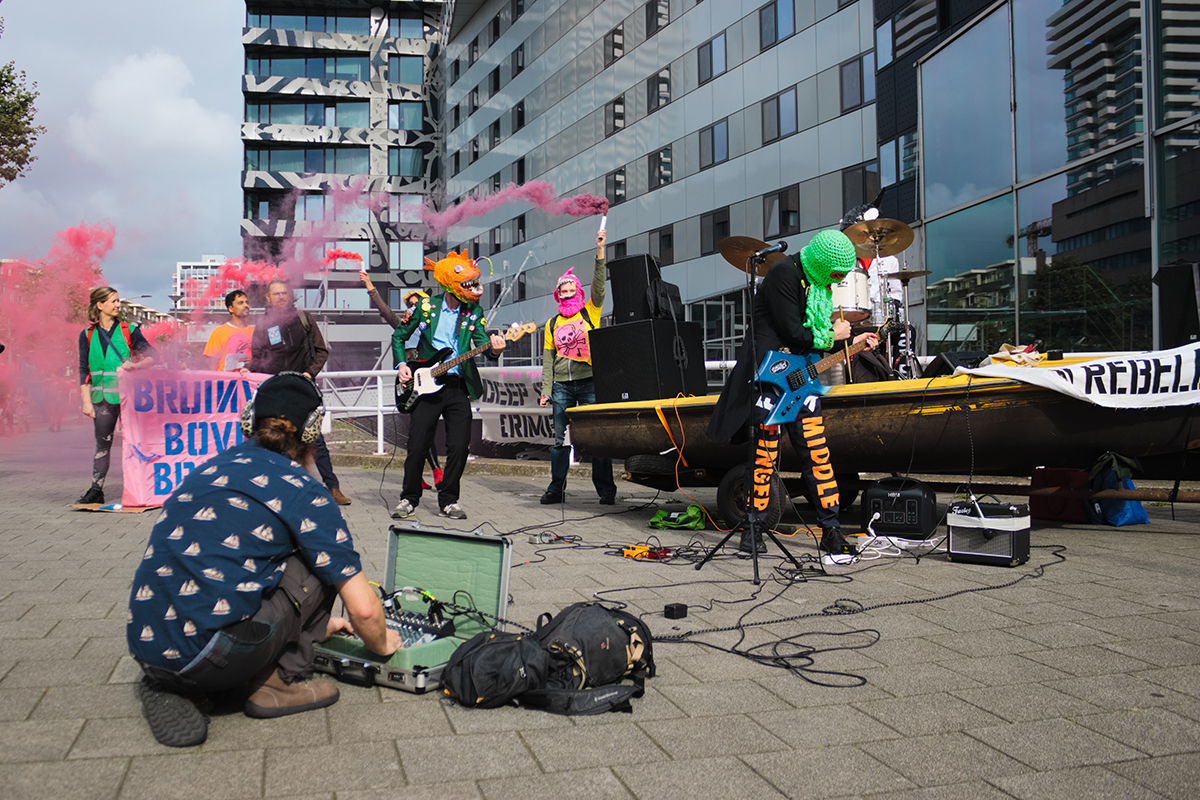
Despite a complete lack of international regulations and any permission to go ahead, Dutch and other deep sea mining companies met in Rotterdam. The ‘Underwater Minerals Conference’ is a meeting to forge plans to mine the deep seabed. All attendees were hoping for a quiet day, an unseen day, that’s how they like to do business – out of sight.
The conference website claims the meeting is the ‘The World’s Largest Gathering of Ocean Mineral Stakeholders’. Which is some claim given the fact that humanity and ocean life are really the largest stakeholder of Ocean Minerals. Luckily the Polymetallic Nodules, the deep seas best and only heavy metals band, were on hand to make sure the day went as loudly as possible.
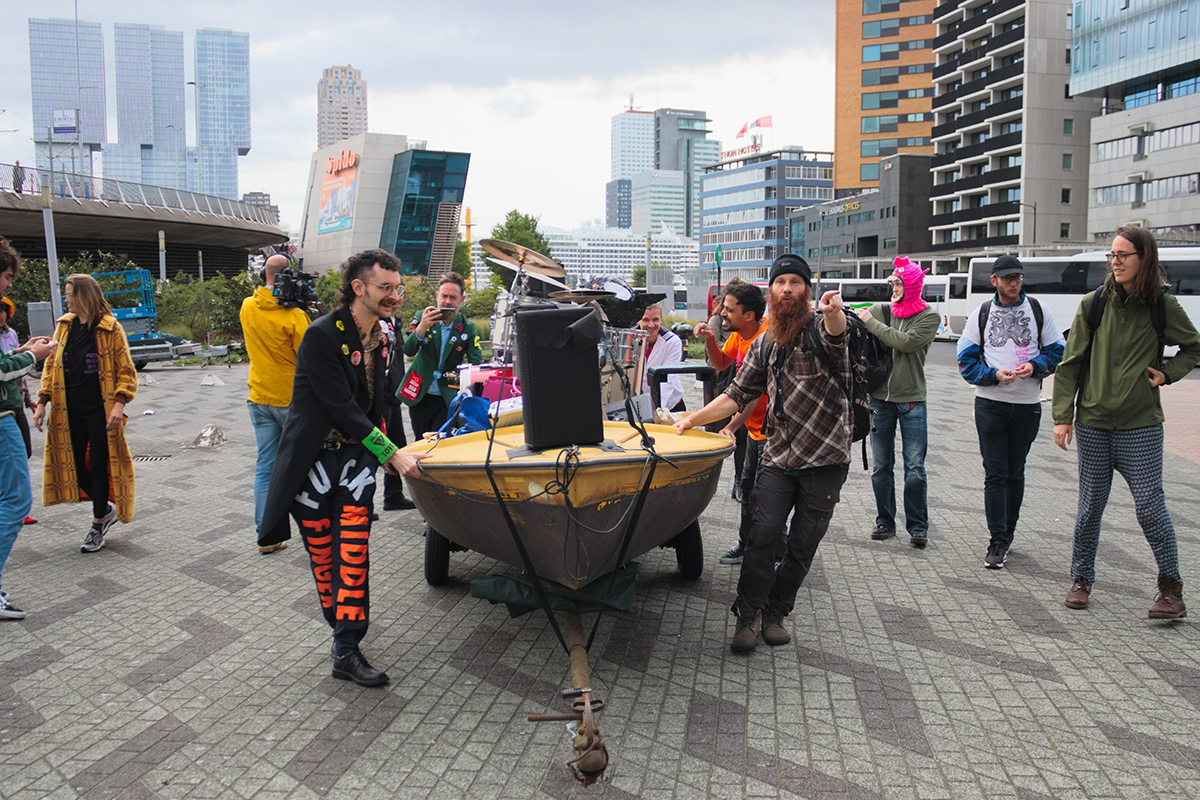
Here comes the noise, the Polymetallic Nodules and crew arrive at the Underwater Mining Plonker Conference.
The Polymetallic Nodule crew arrived at the conference with their boat stage. They positioned themselves below the conference window – and let rip!
A man from the hotel instantly showed up.
But he just stood by and held his ears.
He was followed by a representative of the deep sea mining company GSR. Who handed the crew a letter. It was full of statements like ‘we are investigating… it’s research… we exist for over 50 years…Universities are involved…’. In other words, a letter filled with shallow phrases – and we’re not buying it. Over 700 scientists have said deep sea mining is a deeply flawed idea, so what are you still researching, and with what intent?
Later, by accident, one of our crew met some people who had been at the conference. They had heard the noise and were very grumpy.
Rock on Nodules and feel the noise!
That’s certainly what the crowd at the gig felt, they all had ear plugs which helped, they also enjoyed the free Polymetallic Nodule merchandise on offer.
The fate of the Ocean depends on us all.
Our interventions depend on your support.
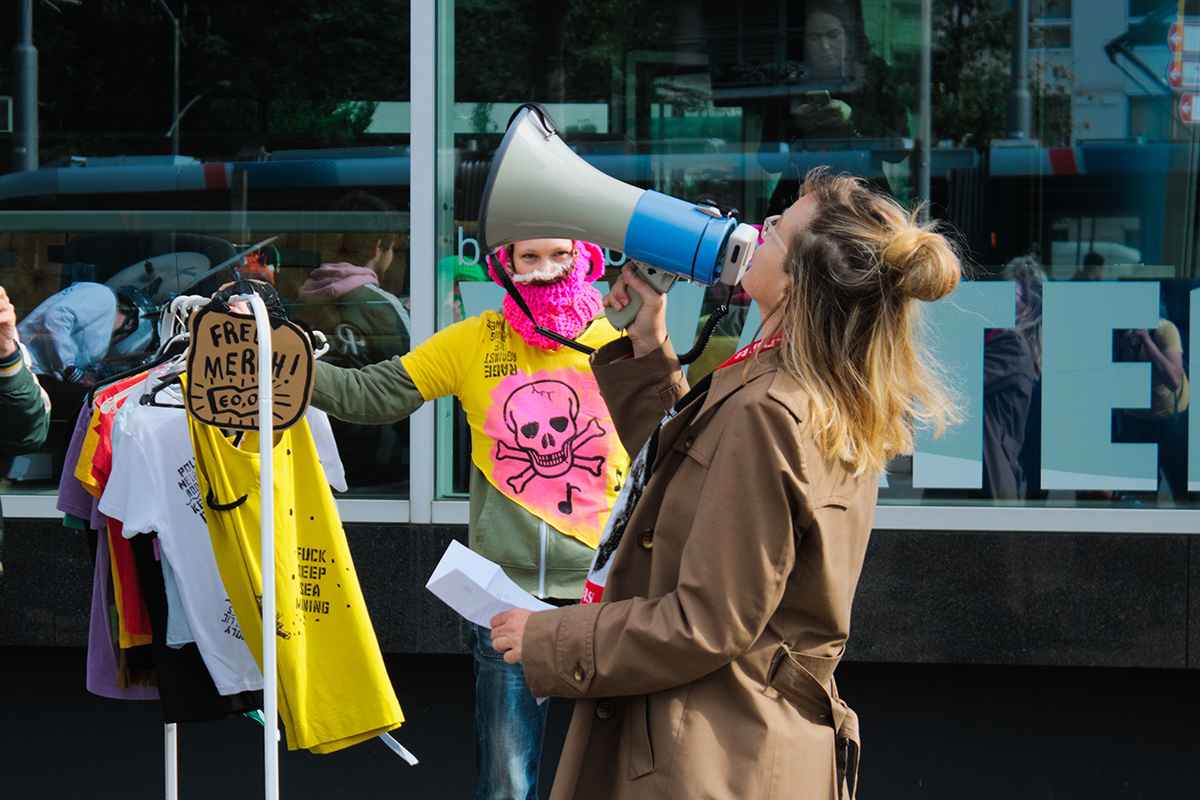
Free hand made merchandise on recycled clothing. Recycling and urban mining are the real solution to managing resources.
What is deep sea mining?
Parts of the bottom of the deep sea contain so-called ‘manganese nodules’. These are mineral rich chunks. These chunks are embedded in little oases of biodiversity, but they also contain metals that can be used in battery technology. Several companies want to mine the deep sea to bring these ‘nodules’ to the surface. These companies are using the ‘green transition’ as an excuse for their plan but this excuse just doesn’t stack up.
What’s the state of play with deep sea mining?
In July this year, to avert a catastrophic lack of deep sea mining regulation due to decades of (purposeful) inaction, the UN International Seabed Authority (ISA) met in Jamaica. The panicked meeting discussed how to regulate mining in international waters. 21 countries (of the 168 Member States) spoke out against mining, stating there is too much uncertainty about the long list of harms to the environment. As Hervé Berville, France’s representative, stated:
“We cannot and must not embark on a new industrial activity when we are not able to fully measure its consequences and therefore risk irreversible damage to our marine ecosystems.”
The meeting broke down with no clear outcomes. But with no regulation deep sea mining cannot begin – a fact that doesn’t seem to matter to the companies at the ‘Underwater Mining Plonker Conference’.

Keeping look out Ocean style. Fuck deep sea mining.
Why shouldn’t deep sea mining happen?
The deep sea is a fragile ecosystem, tests on the damage done to the deep sea bed in 1980s show that the deep seabed doesn’t recover even after decades of being left alone. Already more than 700 scientists, 14 countries and even companies such as Philips, Volkswagen and Google have spoken out against it.
On and around the manganese nodules live all sorts of marine life, including species we haven’t even discovered yet. Mining disturbs this seabed, causing far-reaching clouds of dust that suffocate all life. And the noise deep sea mining makes disorientates any marine life that relies heavily on sound to create its underwater maps for feeding, mating and communication. Furthermore, the deep sea is our greatest climate stabiliser: the effect on the buffer function of the ocean (the ocean stores vast quantities of C02) is unknown. Deep sea mining might increase ocean acidification and accelerate climate change to a catastrophic degree.
“Hundreds of scientists have warned warned us of the disastrous consequences of deep sea mining to ocean life and ourselves,” yells Stefanie Wels of Ocean Rebellion, “And yet companies are preparing to go ahead, behind closed doors, in this conference. They’re looking for short cuts to begin deep sea mining. They’re looking to deliver a final blow to Ocean life and our environment. Are they mad?”
deep sea mining a final blow to ocean life and to us
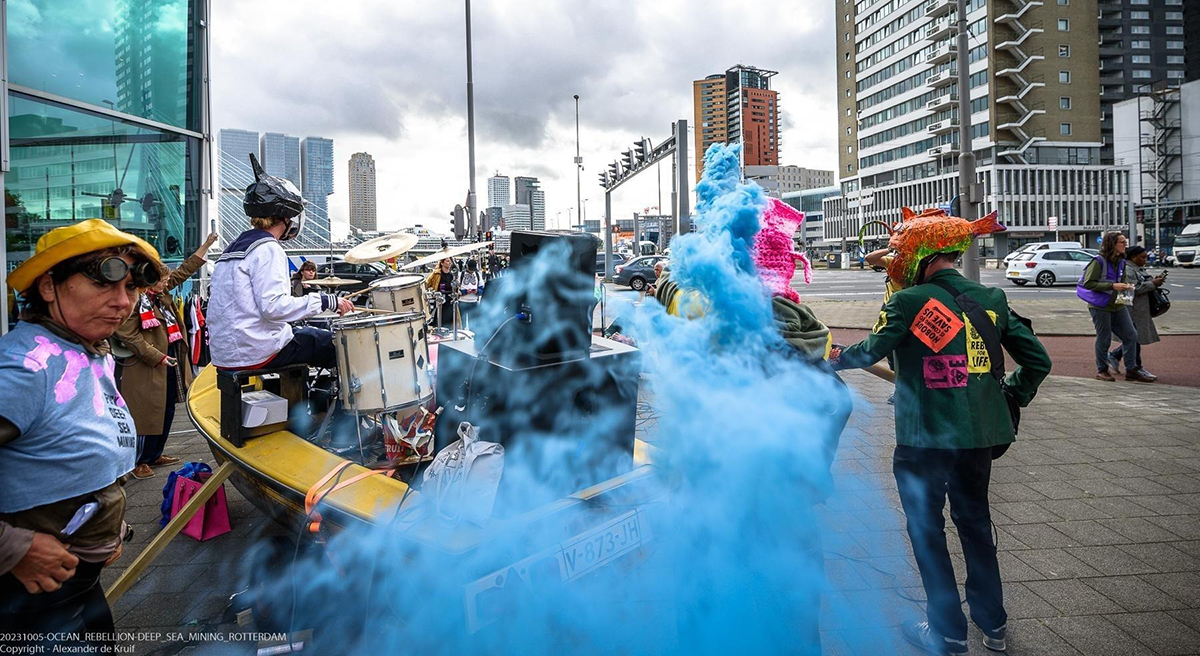
Business as usual is destroying the Ocean. As the sea dies we die.
In The Netherlands business interests always come first.
The Government of the Netherlands is a voting member of the ISA but it never speaks out against deep sea mining. But it does say it will not support mining activities if there is no legal framework approved by the ISA. While saying this is it allows an Underwater Minerals Conference to happen in Rotterdam. And it actively supports Allseas, a former Dutch company, who have many offices and industrial facilities in The Netherlands.
What is the Dutch Government really saying? Looks like it’s sitting on the fence with its hands over its eyes to us. Maybe they need another gig from the Polymetallic Nodules to wake them up?
Damage has already been done by Allseas and The Metals Company.
Mining trials in January by Allseas and The Metals Company were plagued by reports of scientific misconduct and unreported discharges of wastewater into the Ocean. It was even filmed. This is why the Polymetallic Nodules decided to play an unsolicited gig in one of Allseas many car parks.
“The noise pollution from deep sea mining spreads over hundreds of miles, and disturbs whales and dolphins as they search for food” states Max Kreel from Ocean Rebellion, “the noise the Polymetallic Nodules made in Allseas car park is tiny in comparison, but we hope it made a few of their employees choke on their sandwiches.”
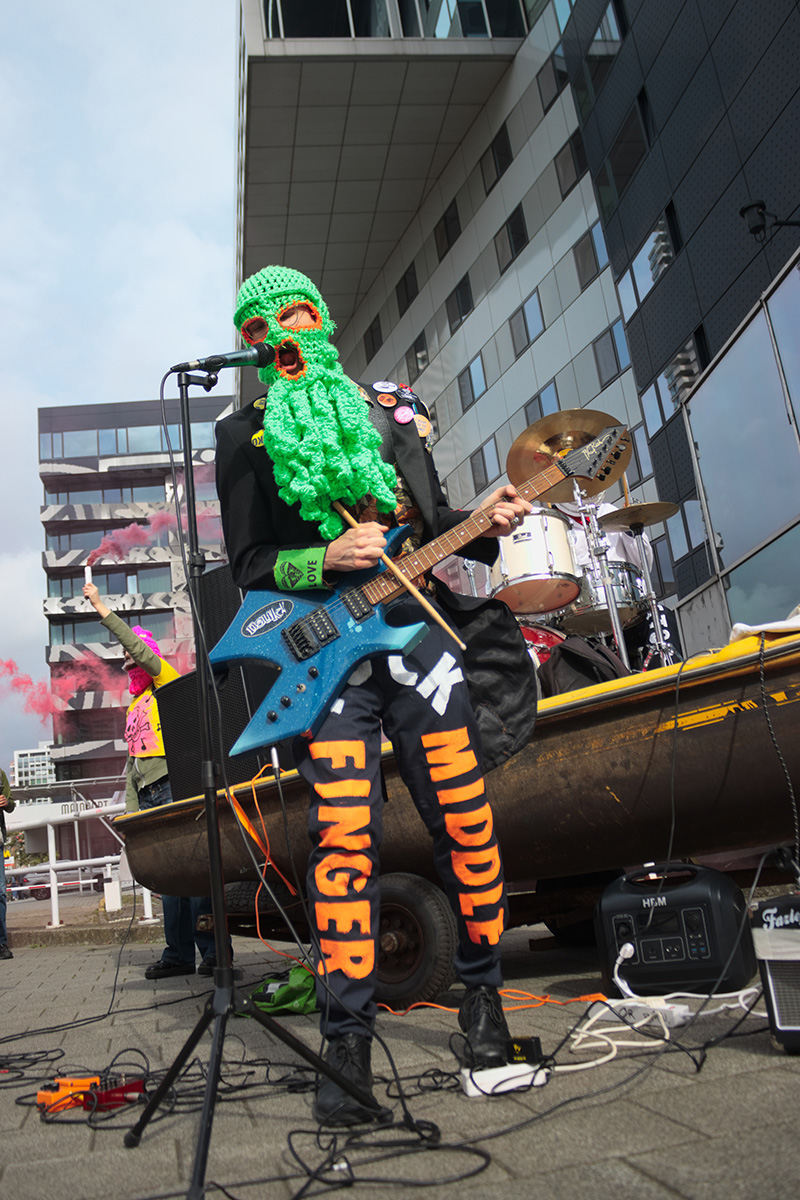
Middle finger to you Allseas and your billionaire owner Edward Heerema.
We’d like to know why Allseas and The Metals Company are persisting with their desire to destroy the deep seabed? We know they claim the metals found there will help supply ‘green growth’ but this doesn’t stack up. None of the metals required for batteries have been found on the deep seabed. Plus it has been scientifically studied that the demand for metals for batteries can be met by urban mining and recycling.
Of course, Ocean Rebellion doesn’t want child labour in mines, but that doesn’t have to happen – endless consumption and false green solutions are the problem. If we consume less we will use less and this less can be supplied by non-extractive means.
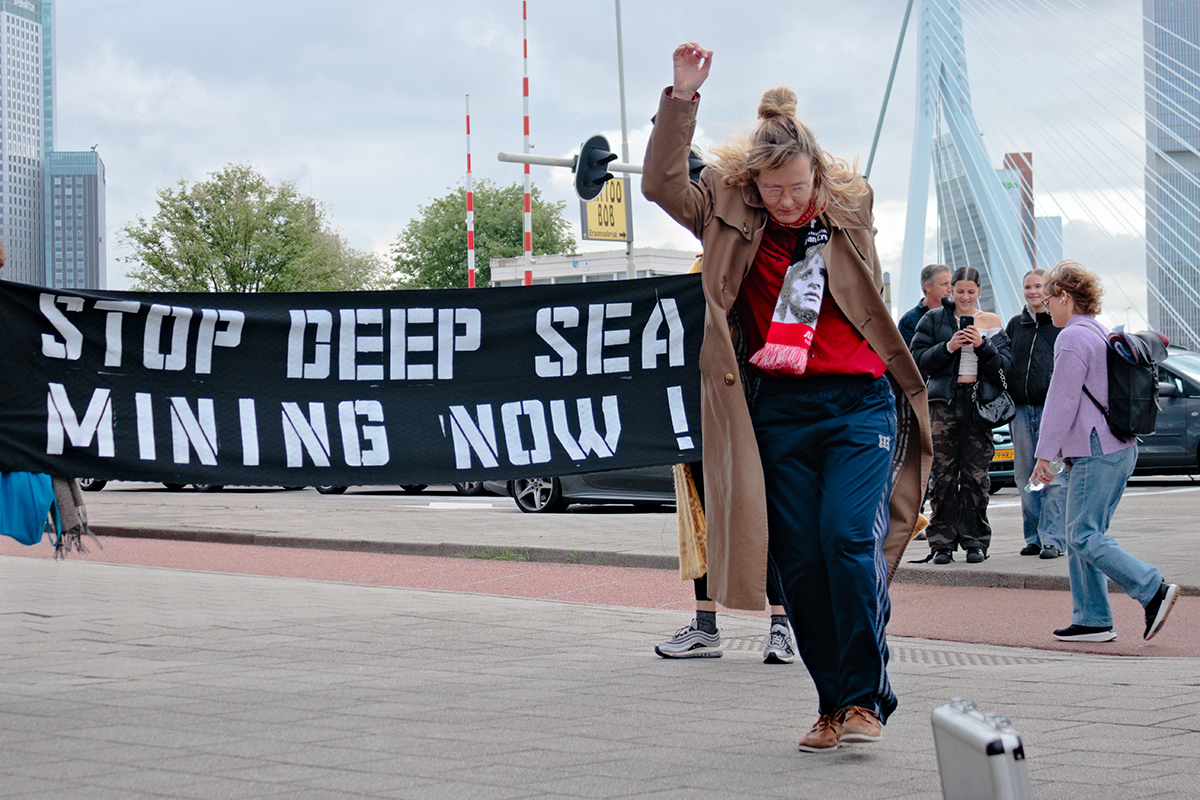
Stop deep sea mining and start dancing.
What do Ocean Rebellion, the Lookdown group, marine scientists and many other marine NGOs want?
All these groups are united in wanting the Dutch government to take a strong stance against deep sea mining. The Dutch Government must demand an end to deep sea mining on the grounds that sustainable deep sea mining does not exist. We ask the Dutch Government to stop listening to the greedy Dutch companies who talk about rich rewards and jobs. Any talk of wealth and jobs must be weighed up against the future of our planet. The Earth has no more margins for error, do not let greedy rich people speculate on the future of the planet, stop deep sea mining now.
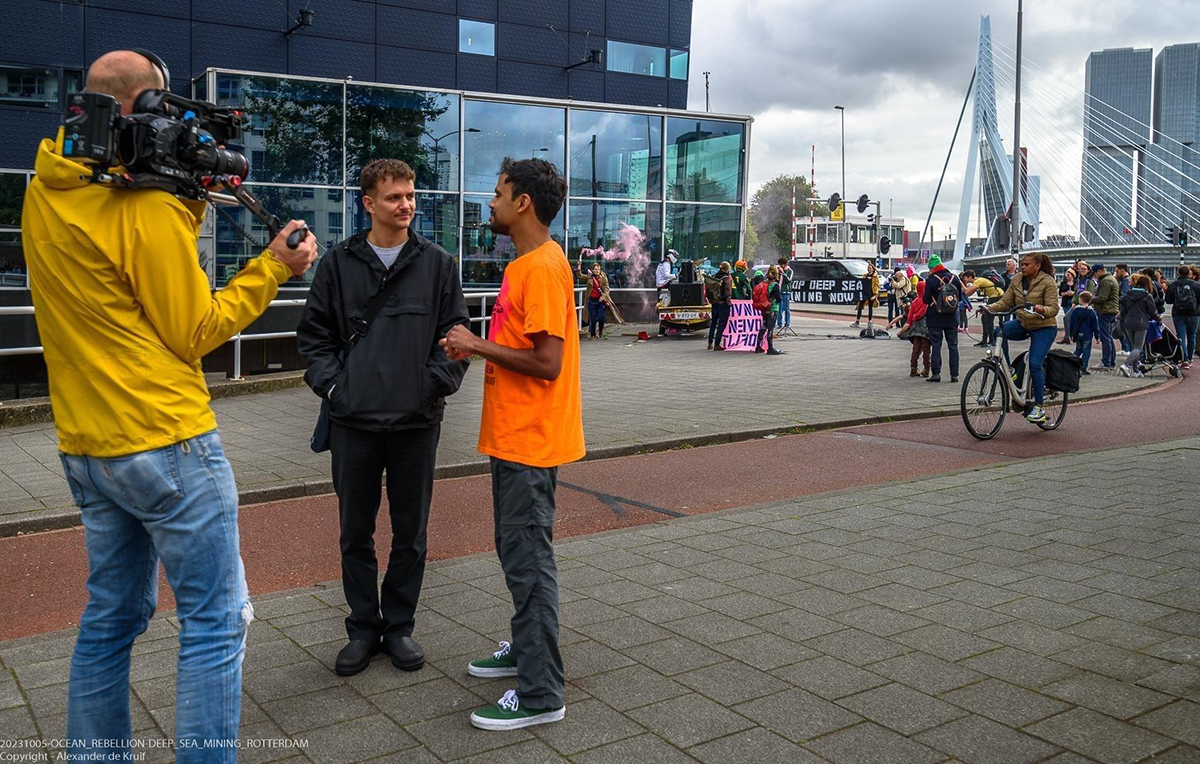
BNN-VARA, Dutch national broadcaster, interview Ocean Rebellion about deep sea mining for a forthcoming climate broadcast.
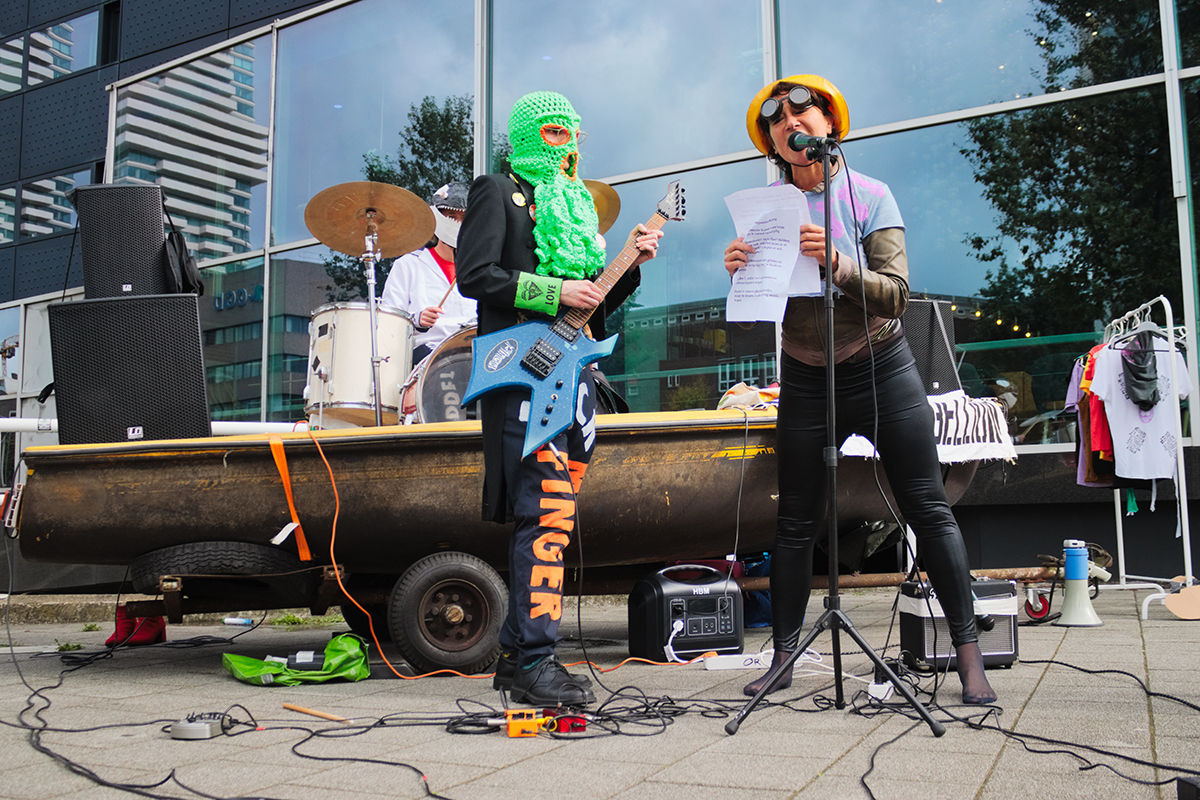
Shout, shout, let it all out – performers make sure the crowd know about the dirty business going on inside the Underwater Mining Plonker Conference.
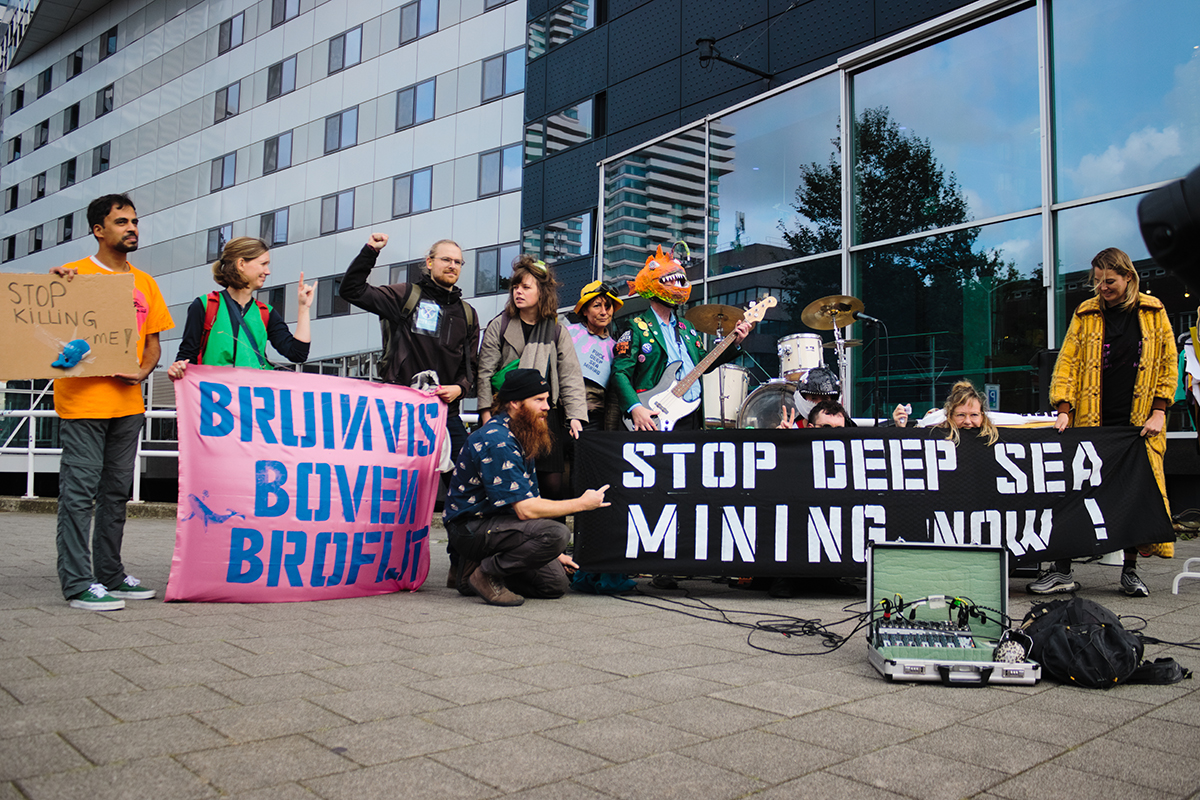
The Pollmetallic Nodules and the crew 🤘.
Photos by, from the top down, 1, 2, 3, 6, 7, 9 and 10 @StratenVanAms; 4, 5 and 8 S. Staines.
The fate of the Ocean depends on us all.
We’ll let you know what we’re doing to help.